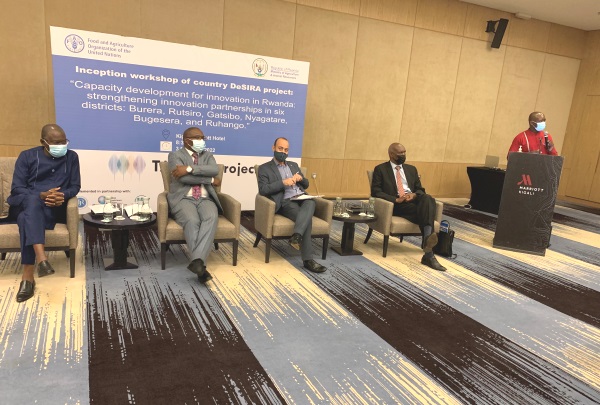
For a period of four years (2021-2025), the project will be developing capacities for innovation in Rwanda, striving to strengthen innovation partnerships in six districts: Burera, Rutsiro, Gatsibo, Nyagatare, Bugesera, and Ruhango.
This project was funded by the European Union and will be implemented by the Food and Agriculture organization of the United Nations (FAO) in collaboration with the University of Rwanda, Rwanda Agriculture and Animal Resources Development Board (RAB), and Ecole supérieure d’agro-développement international (ISTOM).
Thematically, the project will focus on three areas: diversification of livestock and crop systems; effective management of irrigated areas, and crop intensification and diversification in drought-prone areas.
The implementation of the project started in 2021, with the preliminary assessment and inception workshops in all innovation partnerships at the district level to discuss with the project partners, beneficiaries, and stakeholders, the project results and implementation modalities.
The inception workshop at the national level will be held on Thursday 3 February 2022 in Rwanda’s magnificent Marriott hotel to officially launch the project, chart a way forward to a shared vision among stakeholders of Agricultural Innovation Systems, and therefore get every actor geared up to walk the talk.
The high-level inception workshop will be attended by the Permanent Secretary of the Ministry of Agriculture and Animal Resources Mr. Jean Claude Musabyimana, Lluis Navarro, the Head of Cooperation of EU delegation to Rwanda, Prof. Alexandre Ilyambabaje, Vice-Chancellor of the University of Rwanda and the FAO Country Representative in Rwanda, Mr. Gualbert Gbehounou among other officials.
“I really thank the European Union for generously funding this project and the government of Rwanda for a continued swift partnership with the FAO to jointly deploy every means at our disposal for achieving Agricultural innovation and Climate-smart agriculture. This enhances the preventive capacity, adaptive capacity, and anticipative capacity of Rwandan farmers for sustainable thriving Agrifood systems, in a country of a thousand hills” said FAO Representative in Rwanda Gualbert Gbehounou.”
Project’s outputs
The overall goal of the project is to strengthen agricultural innovation partnerships, dissemination of best practices and processes that support climate-relevant and sustainable transformation of agriculture systems in Rwanda.
To achieve the above high-level outcome, the project has to deliver three outputs: (i) facilitate the process of engagement of multi-sector stakeholders and the functioning of innovation partnerships along selected value chains, (ii) address knowledge gaps and technical capacity needs through participatory action research, and (iii) communicate and disseminate best practices for scaling up, and informing the policy process.
The main vehicle of this initiative is the Tropical Agriculture Platform (TAP), which is a Common Framework, an approach and tool kit meant for developing capacities for agricultural innovation systems targeting nine (9) value chains (Potatoes, Diary, rice, maize, beans, horticulture, agroforestry, cassava, Small Livestock).
Rwanda Agricultural sector general information
According to the 2020-21 annual report of the Ministry of Agriculture and Animal Resources, agriculture is the main economic activity in Rwanda with 70% of the population engaged in the sector, and around 66% of the working population employed in agriculture.
The period for cultivation can be divided into the first season (from September to January) and the second season (from February to June).
In the marshlands, where water is abundant, there is also a third agricultural season Mid-June- Mid-September for the cultivation of rice and vegetables.
The agricultural sector accounts for 26% of the national GDP. In general, Rwanda’s GDP has been growing at the rate of 7% since 2014.
Tea and coffee are the major exports while plantains, cassava, potatoes, sweet potatoes, maize, and beans are the most productive and staple crops.
Rwanda exports dry beans, potatoes, maize, rice, cassava flour, maize flour, poultry, and live animals within Eastern Africa. (End)
